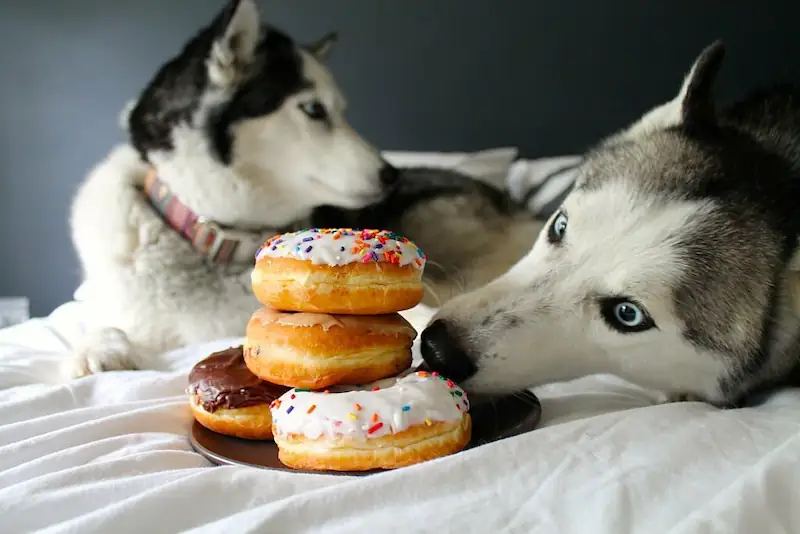As most humans are aware of the sweetness in some foods which makes them likely to eat more of that particular food so is it when it comes to dogs.
It is possible to have caught your little furry friend trying to have a taste of sugar and other sugary contents when they are left lying around and now you’re wondering “Can dogs have brown sugar”?.
Dogs are naturally curious creatures and would often lick almost everything around them.
If you would like to know the effects of brown sugar on your dogs and if it affects them like it does us then you’ll get all that information right here.
Sugar is one of the most used sweeteners in the world and can be found in almost all houses of the world.
You would be surprised at how many modern-day foods contain different forms of sugar.
Is brown sugar right for you pet?

You may have heard some bad things about sugar but that is not pertaining to the white granulated sugar alone.
You probably already know that white sugar is not healthy for you and your pet but you may not know that brown sugar syrup has the same effect as white granulated sugar.
Taking the step to switch from white granulated sugar to brown sugar does not make as much of a difference as you may have thought.
Both brown, white, and other forms of sugar are obtained from the same source and have the same effect.
Brown sugar is refined from the same source as granulated sugar which is sugarcane or sugar beet.
Brown sugar is mostly made up of white granulated sugar combined with molasses.
Brown sugar has the least sucrose content and contains some additional nutrients including a minor quantity of copper, zinc, and iron. After so many processing is carried out for these products, the only nutritional value which they provide is carbohydrates.
Read also: Best dog shampoo for Pitbulls of 2023? Complete Reviews with Buyer’s Guide
Molasses then?
You may have heard about molasses being used in some food products including that of your dog.
Molasses is said to be a natural sweetener and also have some beneficial effects but you would be wise not to believe those statements.
Molasses are not very different from white and brown sugar, however. In fact, it is gotten from the same parent product as the two latter.
Molasses is what you get as a by-product from the processing of sugarcane into the commonly used granulated sugar and although it contains about half the sucrose content that is still a lot. Although molasses contains less sucrose than brown sugar and granulated sugar, excess consumption of it will still leave your dog with the same adverse effect as the others.
Read also: Best Shampoos And Conditioners For Maltese
Effects of sugar on dogs

Dogs need sugar for energy in the form of carbohydrates just as we do as humans but it won’t be a very wise decision to feed your pet brown or granulated sugar or food products that contain artificial sugar.
Just like humans dogs can be attracted to sweets and times that have a lot of sugary content. Dogs have it well within their body system capabilities to eat natural sugar from fruit called fructose although some fruits have been found to be toxic.
Sugar has the same effects on dogs as it does on humans and although they might find themselves attracted to it, consumption of sugar and sugary content is not advisable for dogs.
Sugar can have a lot of side effects as well as damaging effects on the well-being of your pet.
Below are some of the damages that sugar and sugary contents can have on your dog.
Stomach upset
Consumption of sugary treats and contents is likely going to lead to a stomach upset for your dog and this is just the effect in the short term.
Intake of sugar is going to lead to vomiting and diarrhea for your dogs which is going to leave you with a lot of work to do in terms of cleaning.
A higher intake of sugar than most pets are used to can upset the balance of microorganisms in their system. This in return will likely lead to diarrhea and vomiting which can even be bloody sometimes.
So except you enjoy cleaning bloody diarrhea and vomit off the ground then it is best you keep sugar away from your dog.
Damaged cavities
Another damage that sugar is likely to cause for your pet is damaged cavities.
Sugar helps to increase the activity of bacteria in the mouth which causes an increase in acid. Acids increase the loss of minerals in the outer part of the mouth leading to dental diseases.
Although it is difficult to completely avoid feeding your dog food contents with sugar as almost all the food they can eat has some form of sugar. It is however possible to feed them with food that is low in carbohydrates as well as brush their teeth regularly.
Overweight and obesity

Due to the higher calorie content of sugar, it is likely to lead to obesity in your dog just as it can in humans also.
Excess fat and overweight are likely to lead to stress joints as well as other problems along the way.
Among the effects of excess fat and obesity are heart disease and lethargy. It also sometimes leads to difficulty in breathing caused by the increase in fat along the chest wall.
Obesity[1] is also likely to reduce the activity of your dogs and also reduce the quality of life of your pet in the long run.
With obesity being a common occurrence in dogs it is advisable to avoid feeding them sugar and sugary food often.
Diabetes
If the consumption of sugar in your dog is too much, it is likely to lead to obesity which can in turn cause diabetes.
Type two diabetes disturbs the ability of your dog to process sugar due to the inability of the pancreas to produce enough insulin or in some cases very little.
Toxicity
Some types of sugar have been found to be toxic to dogs.
Xyticol which is an artificial in some sugar-free candies and sweets is known to be toxic to dogs.
These types can cause life-threatening blood sugar drops in dogs. When also consumed excessively it is possible for these sugars to cause liver failure. These sugars can also cause frequent urination, restlessness, and seizures occasionally.
Change in metabolism
Sugar leads to an increase in the secretion of insulin which the body utilizes in storing and using sugar amongst other things.
These changes can in turn lead to a change in the immune system and energy level of your pet.
With changes in the metabolism of your dog, there will be changes in its regular activities.
All in all
The effect of sugar on your pets is largely unfavorable and this is a case of wanting something which is not healthy for itself.
It is advisable to keep brown sugar as well as other forms of sugar away from your pet.
It is also best to feed them with less carbohydrate food to help your lovely pet maintain a healthy and balanced life.
In a case where your dog has been found to consume a large quantity of sugar, the vet should be reached on time and informed about the situation and it is also wise to observe the dog properly in that moment.
Can Dogs Have Other Sugars and Sugar Substitutes?
Stay away from all forms of sugar and artificial sweeteners. Although a little sugar here and there isn’t toxic to your dog, it will cause health problems if he eats sugar repeatedly over time. This includes all forms of sugar:
- Brown sugar
- Powdered sugar
- Processed sugar
- Cane sugar
However, xylitol is very poisonous for dogs. If your dog eats even a little bit of xylitol or eats candy or gum with xylitol in it, contact your veterinarian immediately.
Most other sugar substitutes are not toxic to dogs, but they are also not healthy to feed your dog.
Can Dogs Eat Candy and Lollipops?
It’s important to keep an eye on your candy stash to make sure your pup doesn’t get into it. Dogs should never be allowed to eat candy or lollipops. It’s not just because of the sugar; The sweets may contain toxic ingredients such as xylitol, chocolate, raisins, or nutmeg.
Best Recommended for Dogs
Brain Training for Dogs helps dog owners to successfully develop their dog’s natural intelligence and eliminate bad behaviors even if they are first-timers. It’s completely risk-free on your end, and you’ve got nothing to lose with the 60-day money-back guarantee.
Is Brown Sugar Safe for Dogs?
The Effects of Sugar
Sugar, in general, provides a quick source of energy when consumed. In dogs, as with humans, it can lead to an energy spike, followed by a crash.
Potential Risks
Feeding your dog brown sugar in moderation is unlikely to harm them. However, excessive sugar consumption can lead to obesity, dental issues, and, in rare cases, sugar toxicity.
When Can Dogs Have Brown Sugar?
Special Occasions
Occasional small amounts of brown sugar as an ingredient in homemade dog treats may be acceptable. Always consult with your veterinarian before incorporating sugar into your dog’s diet.
Homemade Treats
If you’re considering giving your dog homemade treats that include brown sugar, be cautious not to overdo it. Choose recipes that use small quantities of brown sugar.
Alternatives to Brown Sugar
Healthier Options
If you’re concerned about the potential risks of sugar, you can explore healthier sweetening alternatives, such as natural fruits like apples and blueberries, which dogs tend to enjoy.
Homemade Dog Treat Recipes
Homemade dog treats offer more control over the ingredients. There are numerous recipes available that use alternative sweeteners, like honey or unsweetened applesauce.
Can dogs eat cranberries every day?
While small amounts are generally safe, daily consumption should be moderate to avoid digestive issues.
Can dogs eat raspberries every day?
While raspberries can be part of a varied diet, moderation is crucial. Daily consumption may not be necessary or suitable for every dog.
Can dogs eat raspberry leaves or stems?
It’s best to avoid feeding dogs raspberry leaves or stems, as they can be difficult to digest and may pose a choking hazard.
Can dogs eat watermelon seeds?
It’s best to remove watermelon seeds before feeding them to your dog to prevent choking or digestive issues.
Can dogs eat grapes?
Grapes and raisins are toxic to dogs and should never be fed to them.
Can dogs eat cherries?
Cherries contain pits that can be choking hazards and toxic compounds that are harmful to dogs, so it’s best to avoid them.
Can dogs eat fruits with natural sugars?
Yes, fruits like apples, bananas, and berries are safe for dogs in moderation.
Conclusion
While it’s generally safe for dogs to have a minimal amount of brown sugar on occasion, it’s essential to exercise caution and prioritize their overall health. Consult with your veterinarian to ensure your pet’s diet aligns with their specific needs.
FAQs (Frequently Asked Questions)
Can dogs have a little sugar?
Dogs can have a small amount of sugar on occasion, but it should be given in moderation.
How does sugar affect a dog’s health?
Sugar can lead to energy spikes and crashes, obesity, dental issues, and, in rare cases, sugar toxicity in dogs.
What should I do if my dog consumes a significant amount of sugar?
If your dog consumes a substantial amount of sugar, contact your veterinarian for guidance.
Are there sugar-free treats for dogs?
Yes, there are sugar-free dog treats available that use alternative sweeteners.
Can sugar intake lead to diabetes in dogs?
Excessive and prolonged sugar intake can increase the risk of diabetes in dogs, but it is usually not the sole cause.
Like it? Share it!
can brown sugar kill a dog
side effects of dog eating sugar
how much sugar can a dog have in a day
how many grams of sugar can kill a dog
what to do if your dog eats sugar
can dogs have brown sugar oatmeal
does brown sugar contain xylitol
can dogs have sweet potatoes

